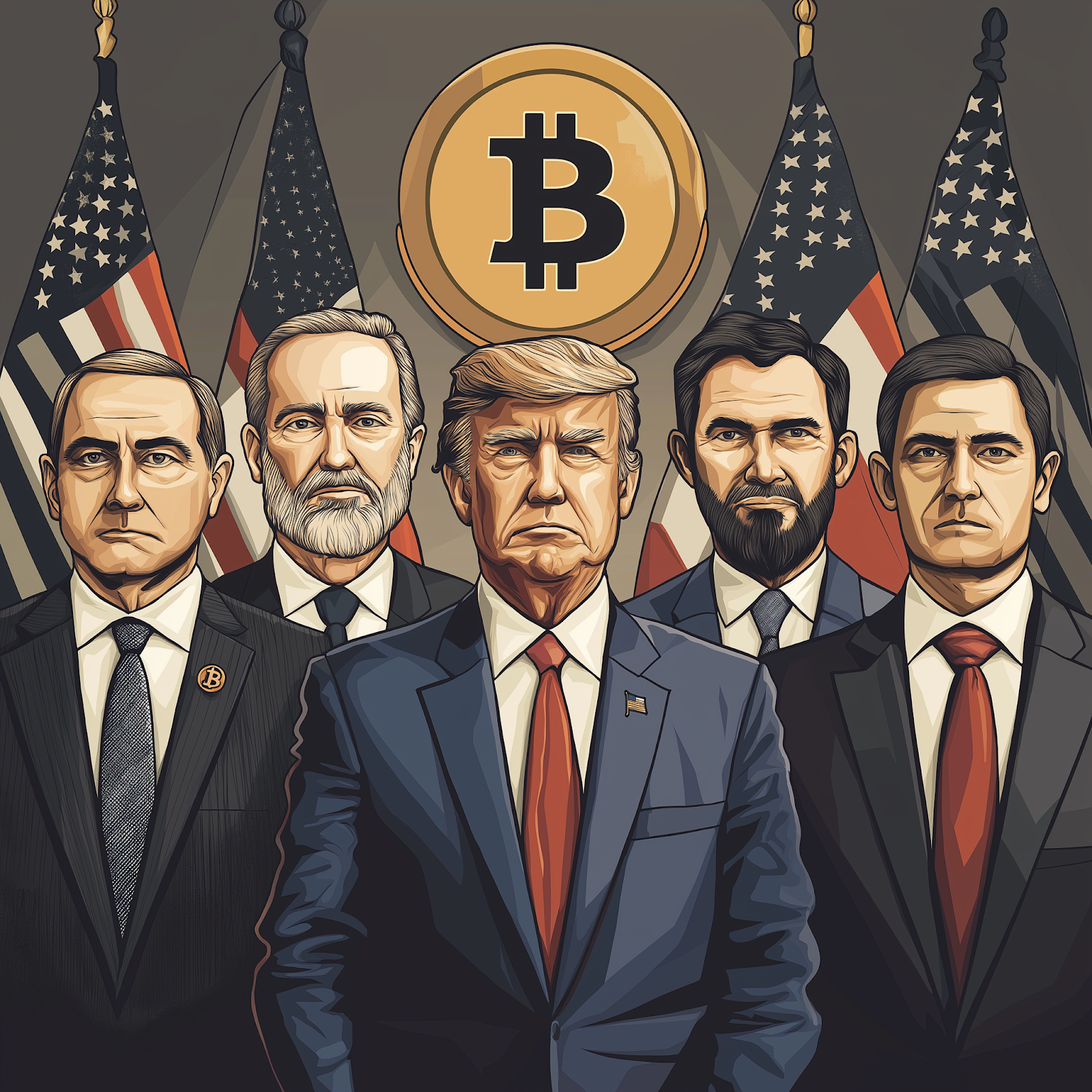In recent years, the attitude of US politics towards Bitcoin has changed significantly. While previous administrations viewed cryptocurrencies with skepticism, the current administration under President Donald Trump has taken a proactive stance. In March 2025, President Trump signed an executive order to establish a strategic Bitcoin reserve consisting primarily of already confiscated cryptocurrencies. This initiative aims to position the US as a leading nation in the digital asset space. This policy realignment has already had a tangible impact: for example, the price of Bitcoin surpassed $90,000 for the first time in January 2025.
Strategic Decisions by the US Government on Bitcoin Integration
The US government’s decision to establish a national Bitcoin reserve marks a significant strategic step. In January 2025, President Trump signed the executive order “Strengthening American Leadership in Digital Financial Technology,” which calls for the formation of a working group to evaluate a national digital asset store. This reserve would consist primarily of confiscated cryptocurrencies and strengthen the U.S.’s financial sovereignty in the digital age. This measure underscores the administration’s ambition to make the U.S. the “crypto capital of the world.”
Corporate Strategies: Bitcoin on the Balance Sheets of Large U.S. Companies
In parallel to political developments, more and more US companies are embracing Bitcoin as part of their financial strategy. A prominent example is GameStop, which announced in March 2025 that it would raise $1.3 billion by issuing convertible bonds to purchase Bitcoin. Earlier, MicroStrategy had increased its Bitcoin holdings to over 500,000 BTC, which is currently worth over $44 billion. These developments show that companies are not only viewing Bitcoin as a store of value but also as a strategic asset to hedge against economic uncertainty.
Regulatory Adjustments and their Impact on the Crypto Market
The US government’s proactive stance on Bitcoin requires comprehensive regulatory adjustments. President Trump announced in March 2025 that he would introduce clear regulations for stablecoins and market structures to promote investment and innovation in the crypto sector. These measures aim to create legal clarity and strengthen investor and business confidence. At the same time, they should help to establish the US as a leading location for digital financial technologies.
Global Implications of the US Bitcoin Strategy
The US initiative to integrate Bitcoin into government and corporate financial strategies has far-reaching global implications. Other nations are watching these developments closely and may consider similar steps to avoid falling behind. The establishment of a US government Bitcoin reserve could set a precedent and promote the international acceptance of cryptocurrencies as legitimate assets. This could lead to a realignment of the global financial architecture, with digital currencies playing a central role.
Challenges and Risks of Bitcoin Integration
Despite the positive developments, there are also challenges and risks associated with integrating Bitcoin into government and corporate financial strategies. The volatility of the Bitcoin price poses a significant risk, as strong price fluctuations can lead to financial losses. In addition, regulatory uncertainties remain, particularly with regard to tax treatment and compliance requirements. Businesses and governments must therefore conduct careful risk assessments and develop appropriate hedging strategies to minimize potential negative impacts.
US States are Banking on Bitcoin Reserves
In the United States, several states are pursuing the integration of Bitcoin into their financial strategies. One notable example is Oklahoma, where the House of Representatives passed the Strategic Bitcoin Reserve Act (House Bill 1203).This law allows the state treasurer to invest up to 5% of public funds in Bitcoin or other digital assets with a market capitalization of over $500 billion. These investments are to be hedged through qualified custodians or through exchange-traded products.
Other states such as Texas, Arizona, and Utah are also considering similar moves to build bitcoin reserves as part of their public finance strategies. However, Oklahoma is the first state to pass such a bill through a chamber.
Relevant article: 20 US states push for bitcoin reserves, could absorb $23 billion in BTC
GameStop Invests in Bitcoin as Part of Corporate Strategy
GameStop, a leading video game retailer, has announced that it will add bitcoin to its investment strategy as a treasury reserve asset. On March 25, 2025, the company announced that its board of directors had unanimously approved an update to its investment guidelines to include bitcoin in the company’s reserves.
https://platform.twitter.com/embed/Tweet.html?creatorScreenName=https%3A%2F%2Ftwitter.com%2F_Ed_Prinz&dnt=true&embedId=twitter-widget-0&features=eyJ0ZndfdGltZWxpbmVfbGlzdCI6eyJidWNrZXQiOltdLCJ2ZXJzaW9uIjpudWxsfSwidGZ3X2ZvbGxvd2VyX2NvdW50X3N1bnNldCI6eyJidWNrZXQiOnRydWUsInZlcnNpb24iOm51bGx9LCJ0ZndfdHdlZXRfZWRpdF9iYWNrZW5kIjp7ImJ1Y2tldCI6Im9uIiwidmVyc2lvbiI6bnVsbH0sInRmd19yZWZzcmNfc2Vzc2lvbiI6eyJidWNrZXQiOiJvbiIsInZlcnNpb24iOm51bGx9LCJ0ZndfZm9zbnJfc29mdF9pbnRlcnZlbnRpb25zX2VuYWJsZWQiOnsiYnVja2V0Ijoib24iLCJ2ZXJzaW9uIjpudWxsfSwidGZ3X21peGVkX21lZGlhXzE1ODk3Ijp7ImJ1Y2tldCI6InRyZWF0bWVudCIsInZlcnNpb24iOm51bGx9LCJ0ZndfZXhwZXJpbWVudHNfY29va2llX2V4cGlyYXRpb24iOnsiYnVja2V0IjoxMjA5NjAwLCJ2ZXJzaW9uIjpudWxsfSwidGZ3X3Nob3dfYmlyZHdhdGNoX3Bpdm90c19lbmFibGVkIjp7ImJ1Y2tldCI6Im9uIiwidmVyc2lvbiI6bnVsbH0sInRmd19kdXBsaWNhdGVfc2NyaWJlc190b19zZXR0aW5ncyI6eyJidWNrZXQiOiJvbiIsInZlcnNpb24iOm51bGx9LCJ0ZndfdXNlX3Byb2ZpbGVfaW1hZ2Vfc2hhcGVfZW5hYmxlZCI6eyJidWNrZXQiOiJvbiIsInZlcnNpb24iOm51bGx9LCJ0ZndfdmlkZW9faGxzX2R5bmFtaWNfbWFuaWZlc3RzXzE1MDgyIjp7ImJ1Y2tldCI6InRydWVfYml0cmF0ZSIsInZlcnNpb24iOm51bGx9LCJ0ZndfbGVnYWN5X3RpbWVsaW5lX3N1bnNldCI6eyJidWNrZXQiOnRydWUsInZlcnNpb24iOm51bGx9LCJ0ZndfdHdlZXRfZWRpdF9mcm9udGVuZCI6eyJidWNrZXQiOiJvbiIsInZlcnNpb24iOm51bGx9fQ%3D%3D&frame=false&hideCard=false&hideThread=false&id=1904997913950142783&lang=en&origin=https%3A%2F%2Fblockzeit.com%2Fbitcoin-as-a-geopolitical-instrument-of-power-a-detailed-analysis%2F&sessionId=1c0d2dc1b9e0441943dcf9cc7a851a0e400ec1e7&siteScreenName=BlockzeitE&theme=light&widgetsVersion=2615f7e52b7e0%3A1702314776716&width=500px
To fund this investment, GameStop plans to issue $1.3 billion in convertible bonds. These bonds will be invested in Bitcoin and used for general corporate purposes. Following this announcement, GameStop’s stock rose by over 10%.
Impact on the Crypto Market and Institutional Investment
The decision by companies like GameStop to integrate Bitcoin into their financial strategies signals a growing institutional interest in cryptocurrencies. Such moves may encourage other companies to make similar investments, further increasing Bitcoin’s adoption and stability.
At the same time, these developments are creating increased demand for Bitcoin, which can potentially affect the price. Institutional investment could also lead to increased regulation and monitoring of the crypto market, as governments and financial regulators seek to understand and manage the growing influence of cryptocurrencies on traditional financial markets.
Regulatory Developments and Government Initiatives
At the state level, there are efforts to create clear regulatory frameworks for dealing with cryptocurrencies. In Oklahoma, the “Strategic Bitcoin Reserve Act” not only allows investments in Bitcoin but also stipulates that these investments must be held by qualified custodians or through exchange-traded products.
Such laws could serve as a model for other states considering similar initiatives and could ultimately lead to a more coherent national strategy for dealing with digital assets.
Future Outlook and Potential Developments
The integration of Bitcoin into government and corporate financial strategies is still in its early days, but current developments point to increasing adoption and integration. Should more states and companies follow suit, this could further solidify Bitcoin’s position as a legitimate and valuable financial instrument.
It remains to be seen how these trends will develop in the coming years and what impact they might have on the global financial market. The ongoing integration of cryptocurrencies into traditional financial systems could bring both opportunities and challenges, particularly in terms of regulation, security and market stability.
Author
Ed Prinz serves as the chairman of https://dltaustria.com, the most renowned non-profit organization in Austria specializing in blockchain technology. DLT Austria is actively involved in educating and promoting the added value and possible applications of distributed ledger technology. This is done through educational events, meetups, workshops and open discussion panels, all in volunteer collaboration with leading industry players.
Disclaimer
This is my personal opinion and not financial advice.
For this reason, I cannot guarantee the accuracy of the information in this article. If you are unsure, you should consult a qualified advisor you trust. No guarantees or promises of profits are made in this article. All statements in this and other articles are my personal opinions.

